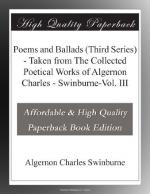|
This section contains 6,456 words (approx. 22 pages at 300 words per page) |

|
SOURCE: "Swinburne, or the Psychopathology of Poetic Creation," in Retreat into the Mind: Victorian Poetry and the Rise of Psychiatry, Princeton University Press, 1988, pp. 184-98.
In the following essay, Faas investigates the negative reaction of Victorian critics to Algernon Charles Swinburne's poetry, which often focused on sadomasochistic, anti-Christian, or other "morbid" themes. Faas notes that Swinburne, like other poets of his time, was criticized as being "morally insane."
In one sense, the Victorian reading public was surprisingly open-minded. While balking at Browning's obscurity, it hardly objected when the poet spoke through the mouth of, say, Johannes Agricola as he gloats over those who, despite their good will or innocence, are predestined to eternal damnation—"the broken-hearted nun, / The martyr, the wan acolyte, / The incense-swinging child" (54-56). Nor did it take offense at Porphyria's lover who strangles his mistress with her own hair in order to preserve pure the...
|
This section contains 6,456 words (approx. 22 pages at 300 words per page) |

|


